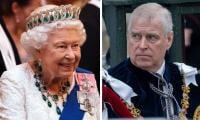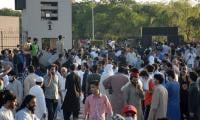ISLAMABAD: The government on Wednesday managed to get the controversial Elections (Amendment) bill, 2021 and the Elections (Second Amendment) Bill, 2021 referred to joint sitting of the Parliament amid strong protest by the all the opposition parties.
With these bills, the PTI-led government moved one step closer to introduction of much talked about Electronic Voting Machines (EVMs) and giving right of vote to overseas Pakistanis and certain other amendments in the Election Act, 2017.
The motion to refer the bills to the joint sitting was adopted by the House in absence of the opposition members who had walked out after pointing out lack of quorum. Since start of the ongoing session on September 17, the government has been failing to complete quorum in the House which prevented passage of the required motion. The opposition on Wednesday made a last-ditched attempt to foil government’s move the motion by pointing out lack of quorum but the House was found in order.
Adviser to the Prime Minister on Parliamentary Affairs Babar Awan moved that under sub-rule (7) of rule 154 of the Rules of Procedure and Conduct of Business in the National Assembly, 2007 read with Article 70(3) of the Constitution, that the Elections (Second Amendment) Bill, 2021, as passed by the National Assembly but not passed by the Senate within the stipulated period of 90 days, be referred to the joint sitting for consideration and passage.
The two bills related to amendments in the Elections Act, 2017 were passed by the National Assembly on June 10, this year but could see day of the light in the Senate within 90 days.
Minister for Law and Justice Farogh Naseem, while rejecting all objections of the opposition members, said the Constitution and the Elections Act authorise the government to make changes in the elections laws and use of advanced technology for fair and free elections.
He said the Election Commission of Pakistan (ECP) also had no jurisdiction to oppose any changes in elections laws rather under Article 222 (d) of the Constitution, it was the Parliament to provide for conduct of elections.
Farogh Naseem also told the opposition that the government wanted to give vote of right to the overseas Pakistanis who send remittances of 29 billion dollars to the country. Earlier, opposing the motion, the PMLN parliamentarian Khawaja Muhammad Asif said all general elections except from 1970 polls were controversial but the incumbent government had started making arrangements to rig next elections, two years before. “The government is laying the foundation to rig next general elections from today,” Khawaja Asif said. He said the opposition just wanted that the vote is given the respect, elections are held in a fair and transparent way. “We are custodian of people’s right of vote and respect the same,” he said.
Khawaja Asif apprehended that the EVMs would be vulnerable to hacking to change elections results. “The countries which introduced EVMs are rolling back the same,” he said, warning the government that dispute of rigging in elections would start from today if the bill is referred to the joint sitting.
The opposition member pointed out that the government in response to a question on Wednesday, informed the House that the FBR system was subjected thousands of cyber attacks and system was breached thrice in the last three years. He said in the question, the government also admitted that the tools available with hacking community, have become even powerful. “If the government wants introduce EVMs which could be subjected to hack for illegal use,” he questioned.
Khawaja Asif said any unilateral attempt by the government for any electoral reforms would be based on bad intentions as the Speaker had already constituted a parliamentary committee to take up matters related to elections laws.
He said that following cantonment boards elections in which the ruling party secured 26% polled vote, fears that it would lose next elections if held in fair and transparent way. Minister for Human Rights, Dr Shireen Mazari said EVMs are used in United States, India and many other countries.
The PPP parliamentarian Syed Naveed Qamar, while strongly opposing the government’s move to refer the bill to the joint sitting, also observed that it would mean start of rigging two years prior to elections.
The JUI-F Asad Mahmood said the opposition could not expect the government which came into power by stealing 2018 elections that the next elections would not be stolen. He said that negotiations on elections laws were under process when the government is going to make amendments in elections act.
The House also referred the International Court of Justice (Review and Re-consideration) Bill, 2021; the Anti-Rape (Investigation and Trial) Bill, 2021; the Criminal Law (Amendment) Bill, 2021; the National Vocational and Technical Training Commission (Amendment) Bill, 2021 and Hyderabad Institute of Science and Technology bill to joint sitting of the Parliament. All the referred bills were passed by the National Assembly.
Justice Abdul Shakoor Paracha fixes hearing on December 24 regarding Islamabad constituencies
Police made one arrest after vehicle drove “at least 400 metres across the Christmas market”
Incident occurred when couple, along with their child, was travelling in their car
Congress party dismisses incident as political gimmick
"I am sure once negotiations start, things will move forward," says NA speaker
Discussion focuses on enhancing governance, accountability and functional autonomy within police







